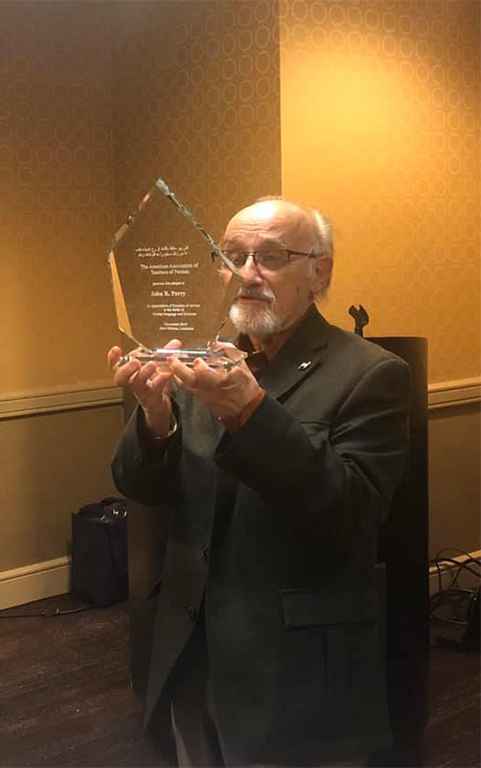Humanities Emeritus Professor Receives Lifetime Achievement Award for Advancing Persian Literature and Linguistics

A seminal figure in the historical sociolinguistics of Iran, UChicago scholar John R. Perry recently received the Lifetime Achievement Award of the American Association of Teachers of Persian at the Middle East Studies Association Conference in New Orleans. Fluent in several languages including Persian, Tajik, and Russian, he wrote about changes to the Persian language over the centuries, Persian and Tajik linguistics and culture, and Persian literature and folklore.
Driven by his innate curiosity, Perry’s scholarship is wide-ranging and has resulted in 12 books and multiple articles, including Karim Khan Zand, A History of Iran 1747-1779 (University of Chicago Press, 1979, also translated into Persian, 1986, and Kurdish, 2005) and A Tajik Persian Reference Grammar (Leiden and Boston: Brill, 2005).
“His Lifetime Achievement Award from the American Association of Teachers of Persian also acknowledges the more than three decades during which he taught Persian to many students at UChicago who have now become professors of Persian in their own right at other institutions,” said Franklin Lewis, Associate Professor of Persian Language and Literature and Chair in the Department of Near Eastern Languages and Civilizations. “In addition to his rigorous scholarship, John also wrote the funniest—yet still very informative—academic article I have ever had the pleasure to read: ‘Monty Python and the Mathnavi: The Parrot in Indian, Persian, and English Humor.’ ”
Through his work, Perry sought to explain the linguistic features and social and political forces that made spoken Late Middle Persian into New Persian, an international literary language throughout the eastern Islamicate cosmopolis from ca. 1000 until 1900; sketched the development of lexicography in the Persian tradition; described the nature of spoken Persian of Iran in the Safavid period (1501–1722 CE); and revealed previously unexplored influences of Arabic and Turkish on Persian. He also translated influential works of early 20th century authors, such as the Lebanese Mikhail Naimy, the Tajik Sadriddin Aini, and the Iranian satirist Ali-Akbar Dehkhodā.
While Perry has continued to write books and articles, he officially retired in 2005 after teaching UChicago students since 1972. He worked in the Near Eastern Languages and Civilizations Department where he introduced courses in Tajik language and literature, but his scholarship intersected the Departments of Linguistics and South Asian Languages and Civilizations also in the Division of the Humanities.
“There’s so much cross-departmental work at UChicago,” said Perry, Professor of Persian Emeritus in the Department of NELC. “If I hadn’t been at UChicago, I might not have pursued linguistics in my research and scholarship or been able to travel so extensively for field research.”
His wide-ranging journeys have included field research in Iran, Iraq, Kurdistan, Tajikistan (as it celebrated independence from the disintegrating Soviet Union), China, Afghanistan, Pakistan, and India. Perry traveled the Karakoram Highway in northern Pakistan into China’s far western city of Kashgar after videotaping the annual Muharram mourning procession at the Shiite enclave of Skardu in the Gilgit-Baltistan region of Pakistan.
“Some of the best sources for my work came from informants in the fields or other odd places,” Perry said. “Off-the-wall contacts and references were the most useful and the most enjoyable.”
Once he was traveling to Kashmir, India, when the bus stopped at midnight in the middle of nowhere. Perry climbed out of the bus and found a bookstall still open. He discovered a 1970s pilgrims’ phrasebook in Arabic script for Shiite visitors to shrines in Iraq, with an extensive tri-lingual glossary in Persian, Arabic, and a local dialect of Tibetan. The book may open a window into the religious vocabulary of a community at the interface of Tibetan Buddhism and Shiite Islam. Perry has found a Tibetanist collaborator and says, “It will be the most exotic thing I’ve done if it comes off.”
His introduction to Islamic studies began at his grammar school in England, when a mentor suggested that he satisfy his hankering for a new (sixth) foreign language by taking up Arabic when he went to college. This led Perry to the Persian language, spurring his lifelong attraction to Arabic morphology and the study of Persian culture and literature.
Born in England, he received his PhD in Oriental Studies for Arabic and Persian in 1970 at Cambridge University (Pembroke College). During his summer vacations, Perry hitchhiked from England to Egypt and Iran. During his PhD program, he studied Persian at Tehran University from 1964 to 1965. Before his tenure at UChicago, Perry taught in the Arabic Studies Department at the University of St. Andrews in Fife, Scotland, from 1968 to 1972.
“Curiosity is the mainspring of my life,” Perry said. “I like writing and researching cultures and languages, and have found that I need to find new things to study or else I stagnate.”